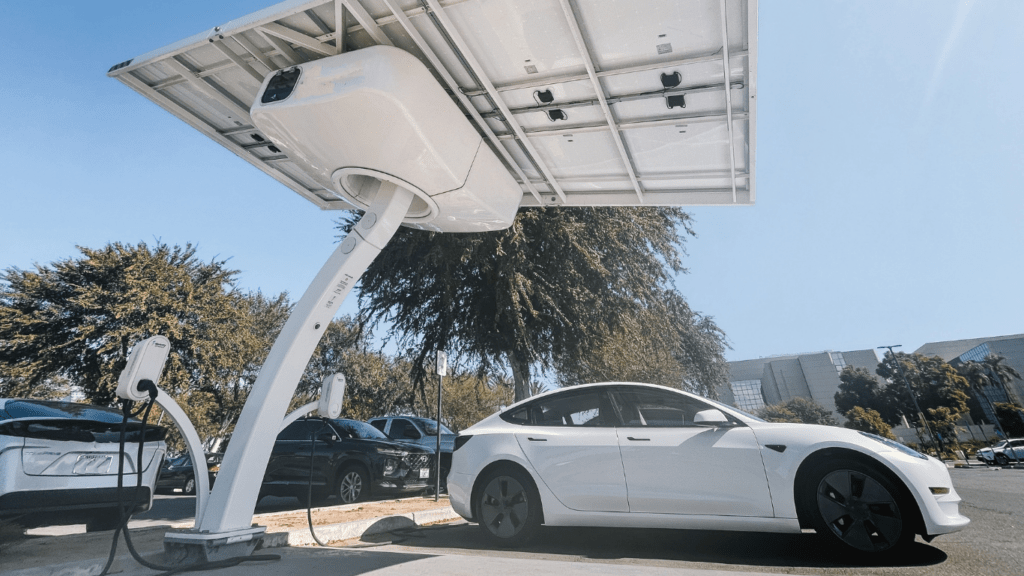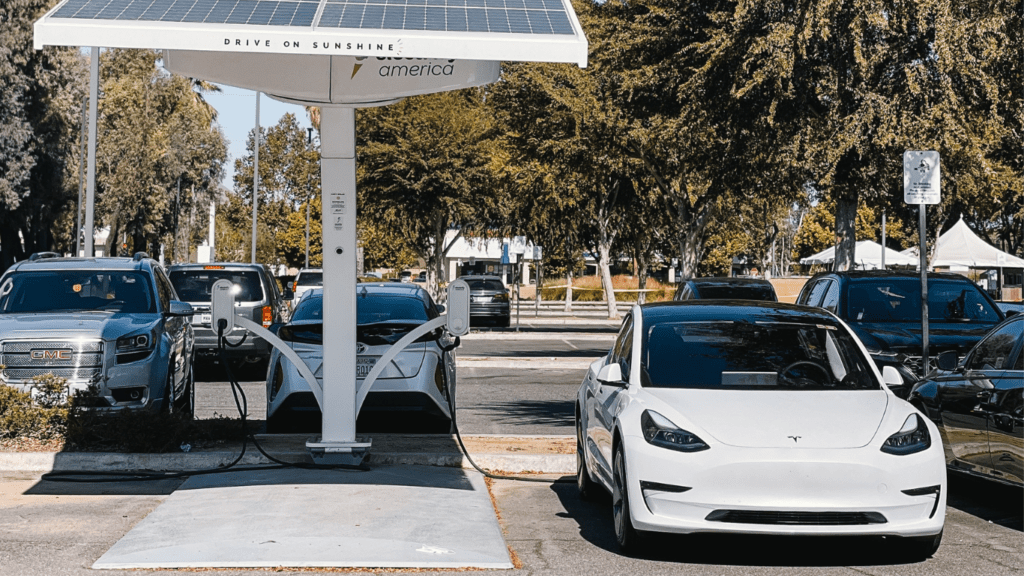Rise of Electric Vehicles
Electric vehicles (EVs) are reshaping the auto rental landscape. In 2024, the presence of EVs in rental fleets is set to grow significantly, driven by technological enhancements and environmentally conscious consumers.
Enhancements in Charging Infrastructure
The expansion of charging networks is critical for the rise of EVs. Companies like Tesla and ChargePoint are set to increase the number of charging stations, making it more convenient for renters to charge their vehicles. In urban areas, public charging stations are becoming more accessible, reducing range anxiety. By expanding to highways and rural places, charging infrastructure ensures that long-distance travel in EVs is more feasible.
Growth in EV Fleet Availability
Rental fleets are diversifying with more electric models. Major companies such as Enterprise and Hertz are investing substantially in EVs. In 2023, Hertz announced the addition of 100,000 Tesla Model 3s to their fleet. Similarly, smaller rental firms are incorporating various EV brands to attract eco-conscious customers. This growth reflects not only a market shift towards sustainability but also a response to increasing consumer demand for greener transportation options.
Integration of AI and Automation
In 2024, AI and automation will play a crucial role in transforming the auto rental industry. Companies embrace these technologies to enhance efficiency and customer experience.
Advanced Customer Service Solutions
Rental companies use AI-driven chatbots and virtual assistants to improve customer service. These tools provide instant support and answer queries 24/7. Chatbots can handle common inquiries such as:
- pricing
- availability
- rental policies
For more complex issues, they escalate to human agents. Virtual assistants like Siri or Google Assistant help customers manage rental bookings using simple voice commands, streamlining interactions.
Streamlined Booking and Fleet Management
Automation optimizes booking processes and fleet management. AI-driven algorithms analyze customer preferences and vehicle availability to offer personalized recommendations. This saves time for customers and ensures they get suitable options. Automation tools track vehicle status, schedule maintenance, and manage logistics, reducing downtime and increasing fleet utilization. For instance, predictive maintenance systems identify potential issues before they lead to breakdowns, ensuring vehicles are always ready for rental.
Increasing Popularity of Subscription Models
Subscription models in auto rentals are becoming more popular, driven by the demand for flexibility and convenience.
Benefits of Flexibility and Convenience
Subscription models offer flexibility. Customers can swap vehicles frequently without long-term commitments. This is useful for those who need different cars for varied purposes, like a compact car for daily use and an SUV for weekend trips.
Convenience is another key benefit. All-inclusive monthly fees often cover insurance, maintenance, and roadside assistance. This removes the hassle of dealing with multiple service providers. For instance, companies like Hertz and Sixt offer subscription plans that bundle these services, providing a streamlined experience.
Also, subscription models allow for easy upgrades. Customers can change to newer or more feature-rich vehicles as needed. This aligns with the desire for the latest technology and performance features.
Target Audience and Market Response
Millennials and Gen Z form a large part of the target audience for subscription models. These demographics prioritize flexibility and experiences over ownership. According to a 2023 survey by Deloitte, 70% of consumers aged 25-40 prefer flexible mobility solutions over traditional vehicle ownership.
Corporate clients are also adopting subscription models. Businesses benefit from predictable costs and easy fleet management. They can scale their vehicle needs based on project requirements without the burden of purchasing or leasing long-term.
Market response to subscription models has been positive. The number of auto rental companies offering subscriptions has increased. For example, Avis launched its Flex program in mid-2023, addressing the rising demand for flexible rental solutions. Additionally, smaller firms are entering the market with niche subscriptions, such as luxury or eco-friendly vehicle options, catering to specific customer preferences.
Emphasis on Sustainability
Sustainability is a crucial trend in the auto rental industry for 2024. Companies are focusing on eco-friendly practices and responding to the growing consumer demand for greener transportation options.
Eco-friendly Initiatives by Rental Companies

Rental companies are ramping up their eco-friendly initiatives to reduce environmental impact. Many firms are increasing their electric vehicle (EV) fleets, with companies like Hertz and Enterprise leading the way by investing in thousands of EVs. Hertz, for example, added 100,000 Tesla Model 3s to their fleet in 2023. Smaller rental companies are also joining the movement by offering diverse EV brands, aiming to attract eco-conscious customers.
Charging infrastructure development is another significant initiative. To support their growing EV fleets, companies are partnering with providers like Tesla and ChargePoint to expand charging station availability. This effort includes increasing the number of urban, highway, and rural charging options, making it more convenient for renters to charge their vehicles and reducing range anxiety during long-distance travel.
Furthermore, rental companies are adopting green operational practices. These include using sustainable materials in offices and car care products, implementing energy-efficient technologies, and optimizing routes to reduce fuel consumption. Some companies are even offering incentives for choosing eco-friendly options, such as discounts for booking electric or hybrid vehicles.
Consumer Demand for Green Options
The rising consumer demand for green options is driving companies to prioritize sustainability. Customers are increasingly seeking environmentally friendly transportation, pushing the industry to adapt. Surveys indicate that eco-conscious consumers are more likely to choose rental companies that offer greener alternatives.
This demand for green options extends beyond EVs. Renters are looking for hybrid vehicles, which combine traditional engines with electric power to reduce emissions and improve fuel efficiency. Companies like Enterprise and Avis are incorporating more hybrid models into their fleets to cater to this preference.
Consumers are also expressing interest in car-sharing and subscription models that provide access to eco-friendly vehicles without the commitment of ownership. Subscription plans offering electric or hybrid cars are gaining popularity, especially among Millennials and Gen Z, who prioritize environmental responsibility.
The industry’s response to this trend is evident in marketing strategies that highlight sustainable options. Companies are promoting their eco-friendly initiatives through various channels, emphasizing the availability of greener vehicles and the benefits of choosing sustainable transportation. This marketing shift reflects a significant move towards meeting the growing consumer demand for green options in auto rentals.
Expansion of Peer-to-Peer Car Sharing
Peer-to-peer car sharing has rapidly grown as an alternative to traditional car rentals. This trend is set to gain more traction in 2024, driven by consumer demand for more personalized and flexible rental options.
Advantages Over Traditional Rentals
- Lower Costs: Peer-to-peer car sharing generally offers lower rental rates compared to traditional car rental companies due to reduced overhead costs. Examples include Turo and Getaround, where owners set competitive pricing.
- Personalized Experience: Renters find unique vehicle options that cater to diverse needs, such as sports cars, vintage models, or eco-friendly vehicles, enhancing the rental experience.
- Convenience: Peer-to-peer platforms offer quick and easy booking processes through mobile apps. With fewer formalities and more flexible pick-up and drop-off locations, customers save valuable time.
Leading Platforms and Their Impact
- Turo: As a major player in the peer-to-peer car sharing market, Turo’s impact is significant. It offers over 10 million users access to a wide range of vehicles in more than 5,500 cities across the US.
- Getaround: Operating in over 300 cities globally, Getaround provides seamless, instant car rentals through its proprietary technology, eliminating the need for key exchanges.
- HyreCar: Specialized in rideshare and delivery services, HyreCar helps gig economy workers by offering short-term rentals tailored to their specific needs. Their model supports the growing demand for flexible work solutions.
Through these platforms, the peer-to-peer car sharing trend is changing the landscape of auto rentals by offering cost-effective, personalized, and convenient alternatives to traditional rental models.
Contactless Rental Experience
Contactless rental experiences are revolutionizing the auto rental industry. With advancements in technology, these solutions enhance convenience and safety for customers, driven by the need for minimal physical interaction.
Implementation of Digital Keys
Digital keys offer seamless car access through smartphones. Major rental companies, such as Hertz and Avis, have integrated this technology to streamline the rental process. Customers can unlock and start vehicles using mobile apps, eliminating the need for physical keys. This system enhances convenience, especially for airport pickups where long lines are common. Moreover, digital keys improve security with encrypted access codes, making car theft more difficult. Digital keys also allow for remote customer support, enabling troubleshooting without a visit to the rental office.
Touchless Pick-Up and Drop-Off
Touchless pick-up and drop-off services simplify the rental process. Companies like Enterprise and National have implemented self-service kiosks and mobile apps for these transactions. Renters can complete the entire rental process without any human interaction. The system includes vehicle inspection documentation and digital receipts sent directly to customers’ phones. This method reduces waiting times and enhances customer satisfaction by providing a faster, more efficient experience. Additionally, touchless services align with health protocols, offering a safer alternative amidst ongoing public health concerns.
Collaborations with Ride-Sharing Services
Auto rental and ride-sharing companies are collaborating more in 2024 to provide better services for customers.
Hybrid Transport Solutions
Collaboration between auto rental firms and ride-sharing services creates hybrid solutions. These models combine traditional rentals with ride-hailing options to enhance convenience. For instance, a traveler can rent a car for the day and switch to a ride-sharing service for the evening. Such seamless transitions cater to varied needs and preferences, providing a flexible transport experience. These integrated solutions offer cost-effective, time-saving alternatives to owning multiple transport modes.
Strategic Partnerships and Their Benefits
Strategic partnerships bring several advantages. Auto rental companies gain access to ride-sharing technology, streamlining processes. Ride-sharing services expand their vehicle options by utilizing rental fleets. This symbiotic relationship ensures better asset utilization and wider consumer choice. Rental firms like Hertz partnering with Uber illustrate the mutual benefits. Rental fleet vehicles used for ride-sharing reduce idle time, increasing revenue. Customers benefit from the boosted availability of ride-sharing options, improved service reliability, and easier access to a diverse range of vehicles.




